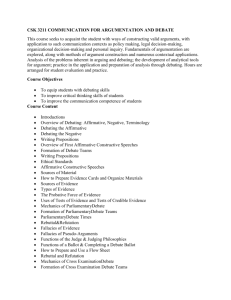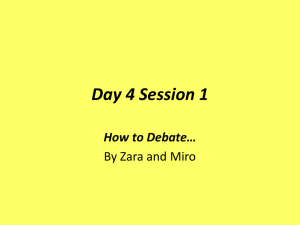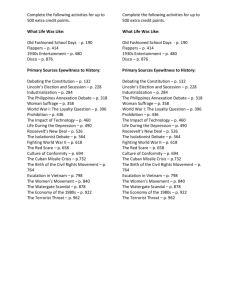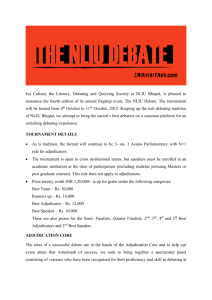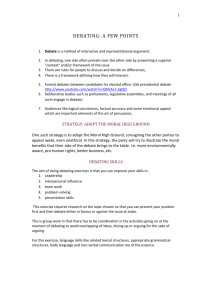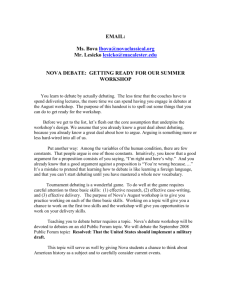WORD - ABC
advertisement
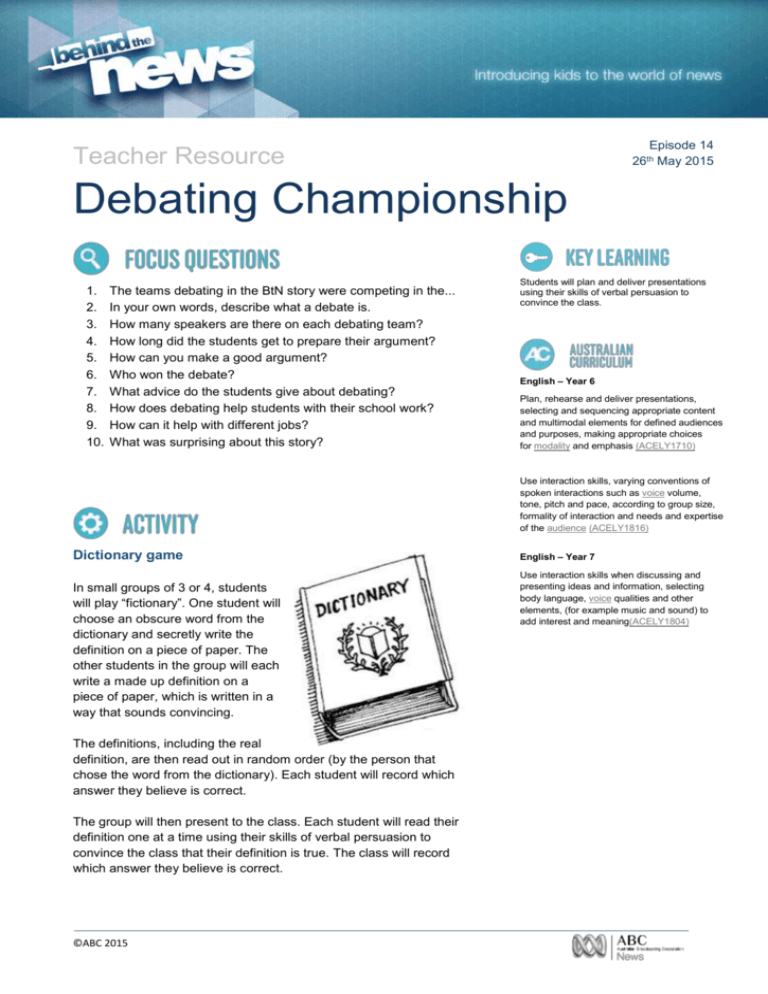
Episode 14 26th May 2015 Teacher Resource Debating Championship 1. 2. 3. 4. 5. 6. 7. 8. 9. 10. The teams debating in the BtN story were competing in the... In your own words, describe what a debate is. How many speakers are there on each debating team? How long did the students get to prepare their argument? How can you make a good argument? Who won the debate? What advice do the students give about debating? How does debating help students with their school work? How can it help with different jobs? What was surprising about this story? Students will plan and deliver presentations using their skills of verbal persuasion to convince the class. English – Year 6 Plan, rehearse and deliver presentations, selecting and sequencing appropriate content and multimodal elements for defined audiences and purposes, making appropriate choices for modality and emphasis (ACELY1710) Use interaction skills, varying conventions of spoken interactions such as voice volume, tone, pitch and pace, according to group size, formality of interaction and needs and expertise of the audience (ACELY1816) Dictionary game In small groups of 3 or 4, students will play “fictionary”. One student will choose an obscure word from the dictionary and secretly write the definition on a piece of paper. The other students in the group will each write a made up definition on a piece of paper, which is written in a way that sounds convincing. The definitions, including the real definition, are then read out in random order (by the person that chose the word from the dictionary). Each student will record which answer they believe is correct. The group will then present to the class. Each student will read their definition one at a time using their skills of verbal persuasion to convince the class that their definition is true. The class will record which answer they believe is correct. ©ABC 2015 English – Year 7 Use interaction skills when discussing and presenting ideas and information, selecting body language, voice qualities and other elements, (for example music and sound) to add interest and meaning(ACELY1804) Example Word: Zephyr Correct definition a soft, mild breeze Fictional definitions a small carnivore from the mongoose family a string quartet that plays only rock music a racing car that is fuelled by kyrptonite Giving feedback As a class watch this short series of videos that demonstrate the various roles of each of the three speakers on a debating team (with thanks to the students at Pulteney Grammar School via Debating SA). First speaker exemplar – link Second speaker exemplar – link Third speaker exemplar – link After watching the videos, students will imagine they have been asked to give constructive feedback to the kids in the videos. The feedback will need to suggest ways that they can improve on their speeches so they are more persuasive. Think about what the speakers need to include and not include. Discuss and share ideas as a class, recording responses on the class whiteboard. Consider the following: Has the speaker developed good eye contact with the audience? Is the speaker talking clearly and not too quickly? How has the speaker used their cue cards? Is the speaker reading from their cue cards word for word or are they just used to remember main points? Is the language easy to understand? How have they used body language to help convey their message? Was their speech interesting and convincing? Debating terminology Use this Debating SA worksheet exercise to help students become familiar with debating terminology. Answers are included (with thanks to Debating SA). Download this worksheet and give to your students. Students will fill in the space with the debating word that matches the definition. ©ABC 2015 Have your say Hold a class discussion and ask students if they think schools should use CCTV cameras to record everything that kids do and say. Explain to students that there are no right or wrong answers and they should think of reasons for and against the idea. Watch this Behind the News CCTV story to learn more about CCTV cameras and why they are bring used around our cities. Students will write a persuasive text about why they think schools should or shouldn’t install CCTV cameras at their school. Teachers, refer to the NAPLAN: Persuasive Writing Marking Guide for this activity. Language features of persuasive texts This activity introduces the structural framework and language features of persuasive texts to your students and allows them to gain an understanding of the purposes of each sentence within a paragraph. Discuss the following arguments and ask your students to rank them from low modality to high modality. Explain that modalities can be high, medium or low and that these have an impact on the certainty of the argument of the writer. Explain that modality can be expressed through choice of auxiliaries, verbs, adverbs, adjectives and nouns. Write the following sentences on the classroom whiteboard and ask your students to rank the arguments from low modality to high modality. Rank the following arguments from the weakest to the strongest It may be a good idea that classrooms use CCTV cameras to record everything that kids do and say. (possibility – low modality) It is a good idea that classrooms use CCTV cameras to record everything that kids do and say (probability – medium modality) Classrooms should use CCTV cameras to record everything that kids do and say. (obligation – medium modality) Classrooms must use CCTV cameras to record everything that kids do and say. (obligation – high modality) Classrooms have to use CCTV cameras to record everything that kids do and say. (obligation – high modality) Class debate Prepare for your class debate using one of the following topics or making up one of your own. Father Christmas has a harder job than the tooth fairy Primary school kids shouldn’t have to do homework (watch BtN’s Homework Debate story) ©ABC 2015 Classrooms should use CCTV cameras to record everything that kids say and do (watch BtN’s CCTV story) Students will work in small groups to brainstorm ideas for both the affirmative and negative and record their ideas on a piece of A3 paper. Students will choose the strongest points from their list of ideas to share with the class. Consider running your own class debate on a topic. Refer to Debating SA’s resources for worksheets, checklists and fact sheets on writing speeches and running class debates. Debrief and reflection In pairs or as a class students will reflect on their learning by responding to the following questions: How difficult was it to think of points to support one side of the argument? Do you think you would have done a better job supporting the other side of the argument? Was I able to convince others of my opinion? Did my opinion change? What did you learn from this activity? Debating SA – Primary School Demonstration Debate (video) https://www.debatingsa.com.au/Resources/Videos.php?videoindex=1 Debating SA – Debating: A brief introduction for beginners https://www.debatingsa.com.au/Schools-Competition/Documents/Debating-An-Introduction-ForBeginners.pdf GoZone Debating – Debate Team Preparation Template http://debating.net.au/wp-content/uploads/2009/02/team.pdf Subscribe to our weekly newsletter for an update on upcoming BtN stories and other useful and relevant teacher information. Visit the BtN website and go to the Teachers page to join up. Encourage your students to be active and informed citizens by watching our 10 minute news program each day. Go to the BtN homepage and click on the 3News link. ©ABC 2015

